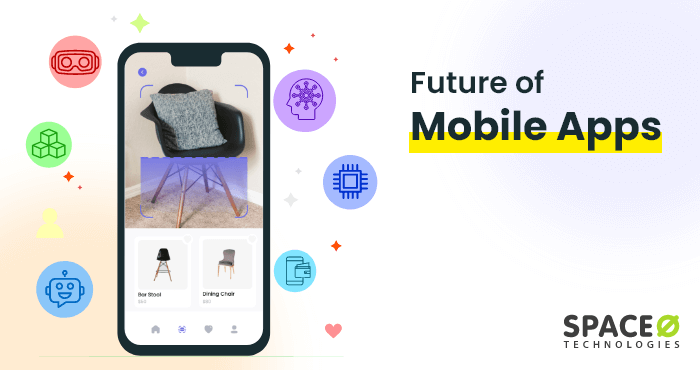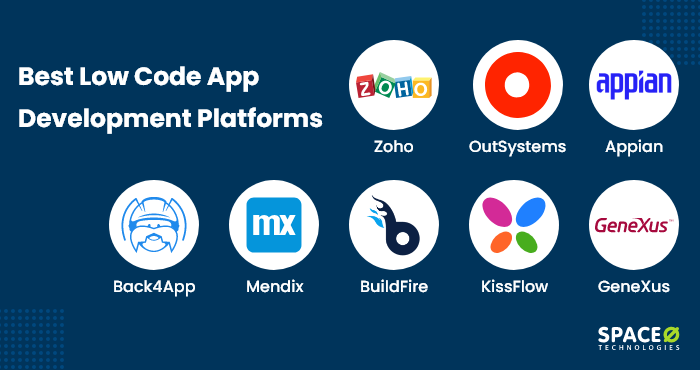By 2027, the total number of smartphone users will surpass 7.6 billion. It’s no wonder the mobile app industry is thriving and getting ready for more ideas and opportunities.
Covid-19 Pandemic, the augment of 5G technology, and the need for convenience will shape the industry for the future. However, there is no surprise that mobile app development, as we know, will change in the coming times.
With newer trends and technologies, app development will see a significant evolution concerning speed, relevance, and connectivity.
A change in the development methods, introduction to new programming languages, new-age technologies (Blockchain, AR, AI), and the need to close down the vulnerabilities will call for innovative thinking and strategic development.
Let’s check the top 14 trends which will help to shape the future of mobile apps.
Table of Contents
- 14 Mobile App Development Trends
- Using OpenAI Technologies in App Development
- Personalization with Artificial Intelligence
- Blockchain Technology
- IoT Applications for Connected Living
- Custom Enterprise Applications
- Cashless with Mobile Wallets
- AR & VR for Immersive Experiences
- Declarative Programming
- Cross-platform App Development
- No Code/Low Code Development
- Support with Chatbot
- Wearable Technology
- Beacon Technology
- Instant Apps
- FAQs about Future of Mobile Apps
- Want to Know the Future of Mobile Apps?
The Future of Mobile Apps: 14 Trends
Whether you have a home or not, you definitely have your own mobile phone. This saying is growing to be true and is currently backed by numbers and a lot of demographic data.
Mobile app development is the future of technology. Let’s take a look at how they will evolve with time and what they will offer to the users.
Using OpenAI Technologies in App Development
If you are searching for future apps that will change the world, OpenAI would be the core part of it. Reason? OpenAI offers a lot of different models, public APIs, and technologies that can be integrated into app development. That’s the reason it secured the top position in our latest trends in mobile app technology.
Technologies like:
- Natural Language Processing (NLP)
- Image Recognition
- Predictive Analytics
Mobile app developers can easily access OpenAI public APIs and SDKs to create advanced mobile application solutions.
You can use OpenAI to create custom applications like:
- Image and video recognization apps
- Content generation apps
- Personal assistant apps
- Chatbots
In fact, at Space-O, we use OpenAI technologies to help one of our eCommerce clients to improve site search speed and grow search-driven revenue by 17%.
If you have a mobile app idea and want to explore how to use OpenAI to take your idea to the next level, you can book your free consultation call with our OpenAI experts.
Want to Create an AI-enabled App?
Let’s talk. We have expertise in creating custom applications using advanced AI technologies.

Personalization with Artificial Intelligence
Artificial Intelligence, along with its subsets Machine Learning and Deep Learning, is creating beautiful chaos in the world of mobile app development. They are one of the top-notch emerging technologies at the moment.
AI extends improvised algorithms and improves its ability to mimic the human counterpart in the best ways possible. Recently, a Google engineer claimed that an AI chatbot has the emotions of a seven-year-old. This went on to become the biggest news.
At this moment, there are several things that you can do with Artificial Intelligence in mobile app development. Use it to make voice recognition easy and assist. For example, when you command Alexa or Siri to do something, they use Artificial Intelligence technology to perform the task.
The pre-programmed algorithm keeps helping them learn from the environment and improve the experience. Even, you can use AI to develop advanced food delivery apps with features like predictive ordering, AI-powered real-time tracking and AI-powered chatbots for customer service. You can also learn more by going through our post on AI app ideas using OpenAI API.
Machine Learning helps create data sets from history to help businesses in many ways. For example, based on the past purchases made by a user, you can recommend things and make the system more personalized. Knowing your audience and their consumption habits, you can personalize the content (email, blogs, etc.) for them.
Going one step ahead, you can even help forecast the sales figures for next month, the fashion that will gain more conversions, and so on. With the right data, you can create predictive analytics solutions for business needs.
Example of AI Integrated Apps Use Cases Amazon We cannot close an example of personalization in mobile application development without talking about Amazon. It has literally pioneered and mastered this space completely. You will notice every page, and the search is personalized to suit your needs. Their AI keeps evolving with new additions and searches. Bloomberg Recently, they created an application in collaboration with AI specialists AlpacaJapan known as the Alpaca Forecast AI prediction matrix. This app will help predict the stock market moves and augment portfolio management. Blockchain Technology
Blockchain is a lot more than just cryptocurrencies and bitcoins. It is the future of the mobile app. Smart contracts that enable complete transparency and crypto wallets are also developed using Blockchain technology.
With this technology, the future will be smart, connected, transparent, and secure. There are limitless possibilities for mobile app developers with this at the forefront. This technology will eventually help with data security in mobile apps.
NFT marketplace is one of the finest examples of how Blockchain will be one of the top mobile app development trends in the coming times.
IoT Applications for Connected Living
The connected device technology combined with cloud technology is sure to leave a long-lasting impression on the mobile app development space. Connected in the cloud is the future of mobile app that connects the devices over wireless technology.
Imagine being able to track your weight and daily exercise routine and saving it to the cloud for comparison. IoT plus cloud computing can help use wearable technology to track digital assets and record them.
It can improve wearable technology and enhance the solutions devised for the same. Siri and Alexa are also examples of connected technology. With time, you will get other smart devices too at affordable rates. With many companies vying for the top position, you will surely get better technology.
Example of IoT Applications Use Case Self Driving cars Autonomous cars can help use intelligent learning to drive the car through known routes. As the car will pick up patterns, it will help you navigate through the roads. It is one of the finest mobile trends to watch out for Smart Devices Your smart devices are a good example of IoT devices. App developers can create futuristic mobile app solutions that enhance the convenience and quality of living. Custom Enterprise Applications
Enterprise applications will be playing a pivotal role in shaping the mobile app development industry for the future. Most enterprises need app solutions to automate processes, improve productivity and ensure tasks are completed on time.
There is a lot of data within the enterprises (read personal information) that needs to be shared with minimal risk of getting hacked. If you use off-the-shelf solutions, it may not empower the organizations with the right level of security. At the same time, it is possible that the solutions may not be able to transfer the data in real-time.
With custom enterprise mobility solution development, you can simplify IT processes as per your needs. It will help ensure that BYOD is still safe and improve data protection. You can build solutions for the tasks that take up a long while, thus improving business productivity. It can also help with the protection of digital assets and secure digital identity for enterprises.
Cashless with Mobile Wallets
When you look at mobile app development, you cannot ignore the radical change that mobile wallets brought in. Even though it is still in the nascent stage, it is still one of the latest mobile app trends that you cannot ignore.
One-tap payments and NFC payment apps wallets have simplified the payment journey. It has enabled many online transactions and increased the number of users. In the post Pandemic times, mobile payments were the source of payments. After a lot of online stores and marketplaces integrated almost all the wallets and payment methods, it became convenient for the customer to shop and pay from a single place.
With newer products, better security, and simplification of transactions, mobile wallets will grow in the future. Google Pay is one such interesting wallet. Here are a few other examples of mobile applications for wallets.
Example of Mobile Wallets Explanation Apple Pay Apple Pay is specifically designed for devices that work on iOS. It offers extensive security. Works in 60 countries globally. Samsung Pay Samsung Pay was created for all Samsung devices. It is accepted at the moment by 24 countries. AR & VR for Immersive Experiences
We have been hearing about Metaverse for a while now. It is channeled to be the new web, and most apps will be developed for this verse. Shortly, you will own several things in the metaverse and would want to create solutions that can simplify your living there. It will impact mobile application development as well by creating the artificial environment required.
Augmented and Virtual Reality are the two facets of the metaverse which will be required to unify the physical and virtual environments.
The mixed reality world is coming to the fore, and many people hold high expectations from this space. Mixed reality will be interoperable, centralized, and distributed, thus giving way to more security and enabling a better future.
Augmented Reality or Virtual Reality enhances the scope of various industries and makes it available without the need for physical presence.
For example, you can take a virtual tour of a property with AR. You can bat in the Lord’s Stadium with VR mobile app development application.
Example of AR & VR App Explanation PokemonGo This game took the world by storm with the way it brought the physical and virtual environment together. It increased engagement with the augmented in its reality Declarative Programming
Most apps contain animations, GIFs, and a lot of graphics. In the case of simple gaming apps, the animations aren’t that complex. However, it used to take time for the mobile app developers to get the animation right and within the frames.
Declarative Syntax, a programming format used by React Native and SwiftUI, will allow developers to introduce complex animations into their applications within minutes using fewer lines. You can easily create and manage animations. It makes animations seamless and aligned throughout the app development process.
With such new trends, the whole ordeal of mobile app development will be reduced, thus paving the way for fast and smooth development.
Cross-platform App Development
While this mobile app trend has gained momentum already, we will see more businesses striving for cross-platform development.
When you start a company, you want to maximize your reach before the competition does. iOS and Android app development individually can cost you a lot of money. You will also need to spend on mobile app security. It will also increase the spending for the business, which you may not be able to afford in the starting stages.
That’s why cross-platform mobile app development is a good way to get started. You will be available on all the platforms your customers use and can offer a similar experience irrespective of the device and platform.
Here are some examples of cross-platform apps that used the right mobile app development frameworks to overcome underlying challenges.
Example of Cross-platform App Development Use Cases Instagram For Instagram, the biggest challenge was to push updates for both iOS and Android simultaneously so that they don’t lose customers. They were able to achieve this with the cross-platform app framework React Native Want to Create Cross-platform Applications?
We can help you. We have designed and developed over 4400 mobile applications from scratch.
No Code/Low Code Development
If you want to make small changes to your existing application or create an MVP, you no longer want to depend on a developer to get started. You may want to partner with someone once the MVP is approved or your idea is validated.
The no-code platforms control future app development as they allow quick collaboration and help drag-n-drop creation. You don’t need a technology background or an understanding of coding platforms to get started.
Similarly, these platforms allow you to deploy these applications faster into the market. Low and no-code platforms can also help developers gain the pace needed to validate and kickstart development.
Here is a list of best low-code app development platforms that you must know.

Here are some no-code app builders and their applications.
Examples of No Code App Builders Use Cases Twilio Studio You can use this simple drag-n-drop tool for appointment reminders, autoresponders, and survey-type mobile application development. It comes with complete documentation for the same. Coda Build your desired app (surveys, quizzes, and more) with this drag-n-drop interface. It is akin to playing with Lego blocks. You can even integrate tables, spreadsheets, and databases with this tool. Support with Chatbot
Once we finish talking about AI, we cannot ignore Chatbot. Though it involves AI, it is a separate entity in the mobile app development industry.
They use neural language processing and are defined using a lot of human characteristics. Say a human is dealing with a customer and extending support. You will notice they are casual, taking in all the necessary details before proceeding with the support.
The bot is trained to do the same thing. With time and numerous patterns, the bot evolves. Companies can create a flow that works best for them and their customers. The idea is to make the bot look more like a human. Yes, put in a lot of emotions and casual conversations.
This will make businesses extra productive in the near future. At the moment, most companies move between their bot and humans. However, with time, and a lot of training sets, bots will take over support while humans can focus on more important aspects of the business.
There are numerous chatbot builders that don’t require developer intervention to create the flow.
Example of Chatbot Explanation Drift They are into conversational marketing and you can see that in their chatbot as well. It holds up plenty of conversations and gives you a lot of insights before it takes you to the agent. You might even get what you want midway from the bot itself. Wearable Technology
We just touched upon the waves the wearable technology mobile trend can cause. Apple Watch and the Airpods are gaining popularity and even customers in the past few years. The fitness industry is gaining a higher reach with the new wearable that is walking into the markets in the nearest future.
Android devices in the wearable segment are also calling for such apps that can track weight, and maintain fitness records. We cannot talk about the devices connected over the Internet without talking about the mobile users for wearable apps.
Beacon Technology
This is one of the most evolving trends in the mobile application development industry. It is majorly used to create apps for a specific location. If you want a customer to enter the physical store while a sale is on, you can use this technology.
Similarly, you can use it to make the messages in the retail segment more intuitive and relevant to increase conversions.
Loyalty programs can use Beacon technology to increase sales and improve conversions. You can use this tech to remove the queue and improve checkout processes.
Instant Apps
Instant apps are the future of mobile app technology. Most people safeguard their phone memory by not downloading the app. This reduces the user base and in turn the profits for your app.
By creating apps like this, you can allow users to access the content without downloading it to their mobile devices. During the mobile app development process, developers will use deep linking that ensures the user’s details are recorded without impacting their disk space. As of now, this is available only for Android devices.
Still, have more questions about the future of mobile apps? Check the following questions to know more.
FAQs about Future of Mobile Apps
What are the top app development technologies?
Here are the top 5 app development technologies to develop mobile apps with advanced features.
- React Native
- Flutter
- Xamarian
- Java
- Swift
How to hire an experienced mobile app developer
Here are a few factors to consider while hiring experienced app developers.
| Factors | Description |
|---|---|
| Experience | Check their portfolio to know if they have created apps in a particular industry. |
| Expertise | They should be experts in the technology and trend you want to use for the particular app solution |
| Reviews | Check what past clients have to say about their app solution |
Want to Know the Future of Mobile Apps?
We went through the technologies and mobile app development trends that will shape the future of this industry. We talked about how augmented reality and VR apps can enhance the Metaverse. We discussed wearable devices, AI, and other future trends that will help create apps personalized and relevant to user needs.
Space-O Technologies has mastered the space of mobile app development by staying abreast with current technologies and developing 4400+ successful mobile applications. We have a defined process that helps us align apps to your goals.
If you want a custom mobile app solution for your business, fill out the contact form and wait for us to get back to you.





